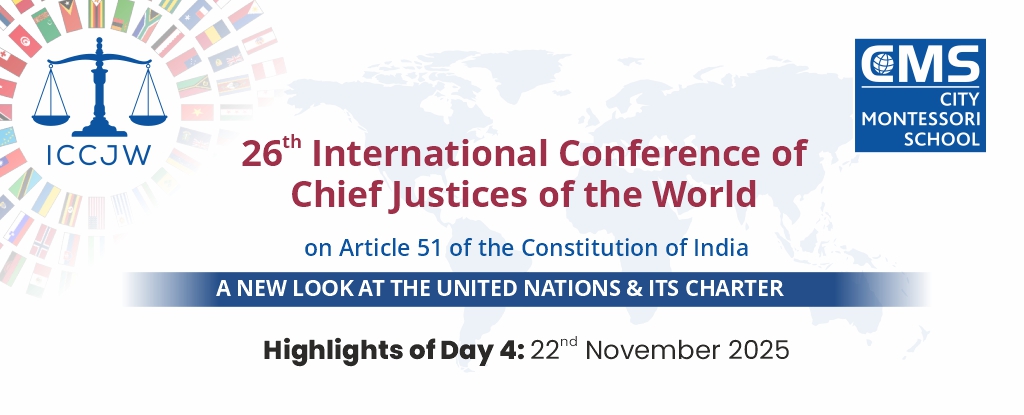United by Law & Science on Day 4 of the 26th ICCJW
Interactive Sessions that Pave the Way for a Safe and Sustainable Future
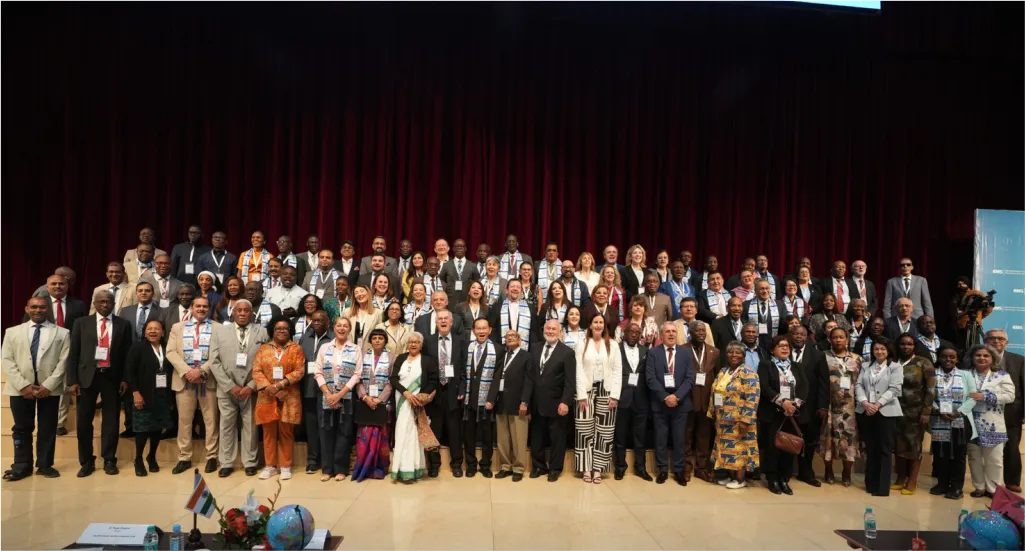
The fourth day of the 26th International Conference of Chief Justices of the World (ICCJW) witnessed a future-focused shift in global legal discourse, as the conference themes moved beyond international issues to the unprecedented legal and ethical challenges emerging from the frontiers of space, science and technology. Held at the CMS Kanpur Road campus, the day brought together chief justices, judges, scholars, presidents, prime ministers, political leaders, and students from over 51 countries, all united by one shared purpose: to build a safer, more just, united, and peaceful world for the 2.5 billion children whose future lies ahead.
Collective Efforts towards a Positive Change
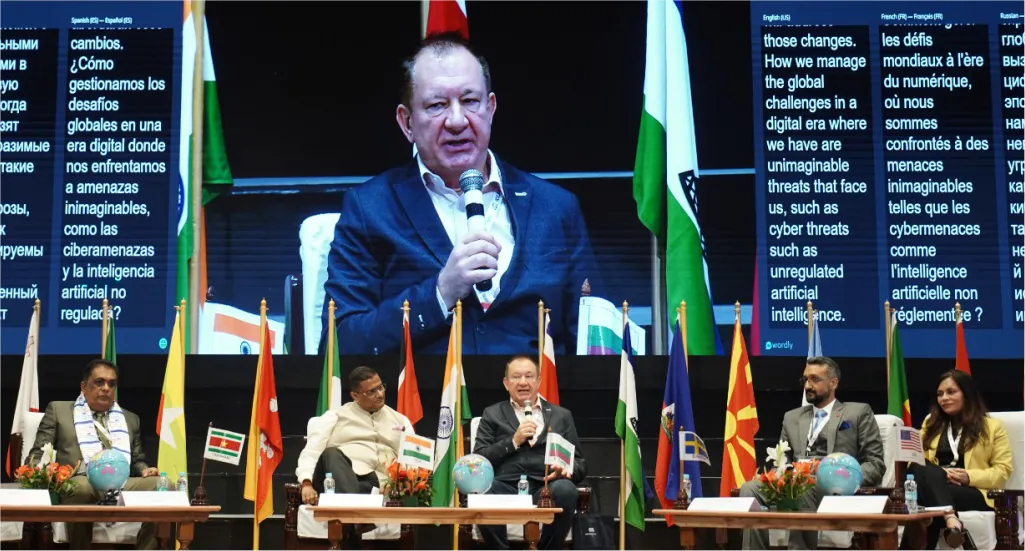
The conference carried forward its tradition of deep intellectual engagement through multiple parallel sessions, which examined some of the most pressing global challenges:
- Reforming global governance and international law
- Strengthening multilateralism and the influence of middle powers
- Combating grand corruption and cybercrime
- Building legal frameworks for climate and health crises
- Judicial cooperation and dispute resolution
- Protection of global commons and the governance of outer space
Contributions from eminent thinkers & leaders, including Justice Anand Koemar Charan (Suriname), Shri Prakash Gupta (India-USA), Ms Lata Bavisi (USA), Dr Mathew George (Sweden), Prof Vesselin Popovski (Bulgaria) and Shri Indrajeet Singh, IAS (India), enriched the discussions and reinforced a shared belief that the world needs enforceable international law, not merely aspirational frameworks.
Voices from Across the Globe
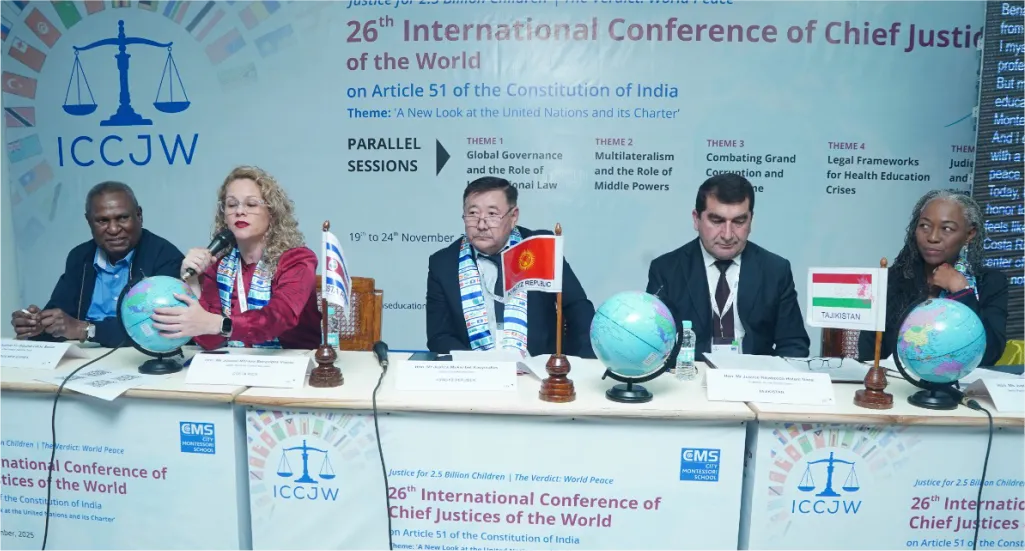
The morning began with compelling addresses from international jurists, each offering a unique perspective on justice, peace and global cooperation.
- Honourable Mr Justice Benjamin Baak Deng, Chief Justice of South Sudan, reminded that the appeal of children must never be ignored and expressed confidence that CMS is preparing future global leaders.
- Honourable Mr Osbert R. Frederick, Speaker of the House of Representatives of Antigua & Barbuda, observed that the world stands at a decisive moment where even small collective steps can bring meaningful global change.
- Honourable Mr Justice Mederbek Satyev, Chairman of the Supreme Court of Kyrgyz Republic, called for more intensive international cooperation to combat corruption.
- In his keynote address, Honourable Mr Justice Jean-Claude Theogene, Vice-President of the Supreme Court of Haiti, emphasised that reason, universal human rights and non-violence must triumph over force and urged nations to strengthen unity based on shared human values.
A Shared Vision for a Changing World – Reflections by Shri Jitendra Singh
Addressing the gathering as the Chief Guest, Shri Jitendra Singh, Minister of State (Independent Charge) for Science & Technology, Government of India, stated that humanity stands at a pivotal moment where rapid scientific advancement must be matched by equally progressive legal frameworks. He stated that technological progress, although transformative and empowering, inevitably brings complex legal and ethical questions. He further said that nations must uphold a delicate balance between freedom, security & privacy and join hands to draft and reinforce laws for emerging domains such as oceans, cyberspace and outer space.
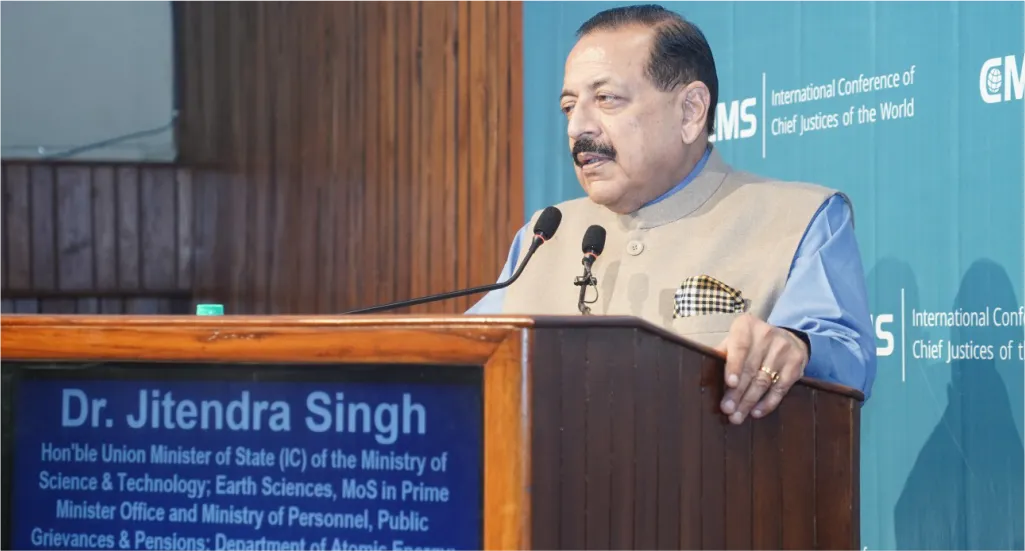
Calling upon jurists to build a strong global network rooted in responsibility and shared values, Shri Singh emphasised that protecting the Earth and ensuring the safety of future generations is no longer a choice; it is an obligation for us.
India’s First Astronaut to the ISS, Shubhanshu Shukla’s Call to Protect the Planet: Humanity’s Only Home
A defining moment of the day was the presence of Indian Astronaut Shri Shubhanshu Shukla, whose insights resonated deeply with the audience. Speaking not only as a ‘Gaganyatri’ but also as a global citizen, he reminded the world that “the Earth is our only home” and that collective responsibility must guide climate action, scientific expansion and space exploration. He urged the audience, saying that humanity must resist any tendency to exploit space for narrow gains and instead approach it with responsibility, ethics and long-term sustainability.
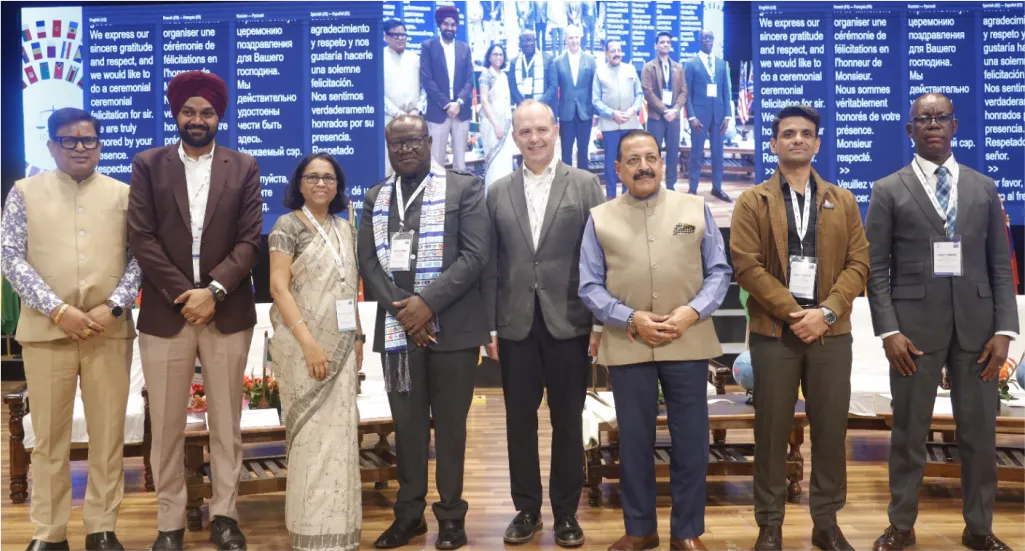
Shri Shukla also directed an earnest appeal to the younger generation to cultivate the mindset and moral courage required to creatively address global challenges, proving once again that the ICCJW is not just a conference of legal minds, but a platform that prepares tomorrow’s leaders.
CMS Leadership and the Spirit of Article 51
Welcoming the distinguished guests, Prof. Geeta Gandhi Kingdon, CMS Manager and Conference Convenor, reiterated the conference’s founding premise — the spirit of Article 51 of the Constitution of India, which advocates the promotion of global peace, justice and international law. In her address, she highlighted that the unwavering commitment of the World Judiciary can become the cornerstone of lasting world peace.
Her words echoed the larger sentiment of the conference that meaningful global transformation begins when law, ethics and humanity work together.
A Meaningful Conclusion to a Powerful Day
The day concluded on a gracious note as Uttar Pradesh Chief Minister Shri Yogi Adityanath hosted a formal dinner in honour of the global dignitaries. As the event moves into its final phase, one message rings clear:
True progress is possible only when nations, leaders and laws work together, not in silos, but in solidarity—for the safety of humanity and the future of every child.
